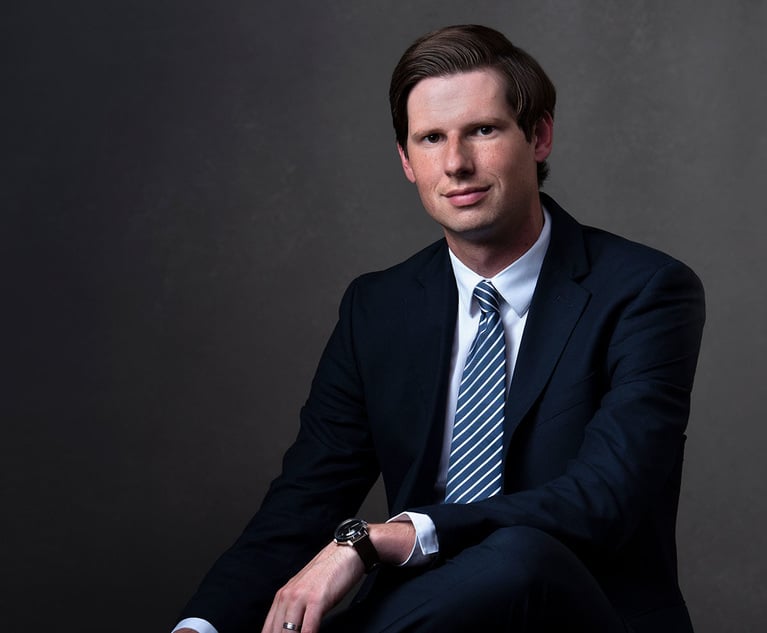Solo Lawyer Is 'Employee' Who Must Pay UC Taxes, Court Says
The Commonwealth Court has ruled that a Scranton solo attorney is an "employee" who must pay unemployment compensation taxes, even though he is self-employed and his income consists of net profit distributions as the sole shareholder of his firm.
January 04, 2018 at 01:36 PM
4 minute read

The Commonwealth Court has ruled that a Scranton solo attorney is an “employee” who must pay unemployment compensation taxes, even though he is self-employed and his income consists of net profit distributions as the sole shareholder of his firm.
In a published Jan. 4 opinion, a three-judge panel of the court unanimously upheld a final decision of the state Department of Labor and Industry that the law firm Carl J. Greco P.C., also known as Greco Law Associates, owes UC taxes even though it consists of only one attorney, Carl J. Greco.
The court rejected Greco P.C.'s argument that Section 4(l)(1) of the Unemployment Compensation Law states that a corporate officer is only subject to UC taxes if he is also engaged in service under an express or implied contract of hire.
Section 4(l)(1) defines “employment” as including “all personal service performed for remuneration by an individual under any contract for hire, express or implied, written or oral, including service in interstate commerce, and service as an officer of a corporation.”
“The department correctly reasoned that both the plain language of Section 4(l)(1) and common sense support the legislature's intent that service as a corporate officer would stand alone as constituting employment,” Judge Robert Simpson wrote for the court.
But Simpson, joined by Judge Anne E. Covey and Senior Judge Dan Pellegrini, added that even if Greco P.C.'s construction of the statute were correct, he'd still be subject to UC taxes.
“In its final decision, the department correctly stated that Section 4(l)(6) of the UC Law includes in the definition of 'employment' any services subject to taxation under [Federal Unemployment Tax Act], which incorporated the definition in the Federal Insurance Contributions Act (FICA),” Simpson said. ”FUTA (through [the Federal Insurance Contributions Act]) defines a corporate officer as an 'employee' for employment tax purposes. The language of the statutory definition is unqualified. It defines an 'employee' as including 'any officer of a corporation ….' There is no requirement that the officer be employed at a salary or under any express or implied contract of service.”
Simpson also noted that the U.S. Court of Appeals for the Third Circuit ruled in the 2004 case Nu-Look Design v. Commissioner IRS that an S corporation, like Greco P.C., was subject to FUTA taxation on profit distributions to its sole shareholder because he was a corporate officer.
In Nu-Look, the Third Circuit also cited the Seventh Circuit's 1990 decision in Joseph Radtke, S.C. v. United States, which rejected the exact same argument that Greco made: that payments made as dividends rather than salary were exempt from FUTA taxation.
“This court defers to federal courts' holdings on questions of federal employment tax law,” Simpson said. “As discussed above, federal courts construe FUTA as imposing employment tax on S corporations for shareholder distributions made to corporate officers; service as a corporate officer constitutes 'employment' under FUTA. Therefore, this court concludes that such distributions are likewise subject to UC taxation based on the definition of 'employment' in Section 4(l)(6) of the UC Law, which includes services defined as such under FUTA.”
Simpson also waved off Greco P.C.'s argument that because Greco's self-employed status bars him from collecting UC benefits, it also exempts him from paying UC taxes.
Simpson said Pennsylvania law is settled on that issue, dating back to the Commonwealth Court's 1978 ruling in Bagley & Huntsberger v. Employer Accounts Review Board.
Simpson also supported the department's reliance on Bagley & Huntsberger and the 1964 Dauphin County trial court ruling in Labe's Men's Shop v. Young in finding that the designation of payments as shareholder profit distributions had no bearing on Greco's responsibility to pay UC taxes.
Greco, who represented himself in the case, could not be reached for comment. A spokesperson for the department also could not be reached.
This content has been archived. It is available through our partners, LexisNexis® and Bloomberg Law.
To view this content, please continue to their sites.
Not a Lexis Subscriber?
Subscribe Now
Not a Bloomberg Law Subscriber?
Subscribe Now
NOT FOR REPRINT
© 2025 ALM Global, LLC, All Rights Reserved. Request academic re-use from www.copyright.com. All other uses, submit a request to [email protected]. For more information visit Asset & Logo Licensing.
You Might Like
View All
People in the News—Jan. 23, 2025—Marshall Dennehey, Duane Morris, Hangley Aronchick
3 minute read
Plaintiff Argues Jury's $22M Punitive Damages Finding Undermines J&J's Talc Trial Win
4 minute read
Pa. High Court: Concrete Proof Not Needed to Weigh Grounds for Preliminary Injunction Order
4 minute read
Trending Stories
- 1Who Are the Judges Assigned to Challenges to Trump’s Birthright Citizenship Order?
- 2Litigators of the Week: A Directed Verdict Win for Cisco in a West Texas Patent Case
- 3Litigator of the Week Runners-Up and Shout-Outs
- 4Womble Bond Becomes First Firm in UK to Roll Out AI Tool Firmwide
- 5Will a Market Dominated by Small- to Mid-Cap Deals Give Rise to a Dark Horse US Firm in China?
Who Got The Work
J. Brugh Lower of Gibbons has entered an appearance for industrial equipment supplier Devco Corporation in a pending trademark infringement lawsuit. The suit, accusing the defendant of selling knock-off Graco products, was filed Dec. 18 in New Jersey District Court by Rivkin Radler on behalf of Graco Inc. and Graco Minnesota. The case, assigned to U.S. District Judge Zahid N. Quraishi, is 3:24-cv-11294, Graco Inc. et al v. Devco Corporation.
Who Got The Work
Rebecca Maller-Stein and Kent A. Yalowitz of Arnold & Porter Kaye Scholer have entered their appearances for Hanaco Venture Capital and its executives, Lior Prosor and David Frankel, in a pending securities lawsuit. The action, filed on Dec. 24 in New York Southern District Court by Zell, Aron & Co. on behalf of Goldeneye Advisors, accuses the defendants of negligently and fraudulently managing the plaintiff's $1 million investment. The case, assigned to U.S. District Judge Vernon S. Broderick, is 1:24-cv-09918, Goldeneye Advisors, LLC v. Hanaco Venture Capital, Ltd. et al.
Who Got The Work
Attorneys from A&O Shearman has stepped in as defense counsel for Toronto-Dominion Bank and other defendants in a pending securities class action. The suit, filed Dec. 11 in New York Southern District Court by Bleichmar Fonti & Auld, accuses the defendants of concealing the bank's 'pervasive' deficiencies in regards to its compliance with the Bank Secrecy Act and the quality of its anti-money laundering controls. The case, assigned to U.S. District Judge Arun Subramanian, is 1:24-cv-09445, Gonzalez v. The Toronto-Dominion Bank et al.
Who Got The Work
Crown Castle International, a Pennsylvania company providing shared communications infrastructure, has turned to Luke D. Wolf of Gordon Rees Scully Mansukhani to fend off a pending breach-of-contract lawsuit. The court action, filed Nov. 25 in Michigan Eastern District Court by Hooper Hathaway PC on behalf of The Town Residences LLC, accuses Crown Castle of failing to transfer approximately $30,000 in utility payments from T-Mobile in breach of a roof-top lease and assignment agreement. The case, assigned to U.S. District Judge Susan K. Declercq, is 2:24-cv-13131, The Town Residences LLC v. T-Mobile US, Inc. et al.
Who Got The Work
Wilfred P. Coronato and Daniel M. Schwartz of McCarter & English have stepped in as defense counsel to Electrolux Home Products Inc. in a pending product liability lawsuit. The court action, filed Nov. 26 in New York Eastern District Court by Poulos Lopiccolo PC and Nagel Rice LLP on behalf of David Stern, alleges that the defendant's refrigerators’ drawers and shelving repeatedly break and fall apart within months after purchase. The case, assigned to U.S. District Judge Joan M. Azrack, is 2:24-cv-08204, Stern v. Electrolux Home Products, Inc.
Featured Firms
Law Offices of Gary Martin Hays & Associates, P.C.
(470) 294-1674
Law Offices of Mark E. Salomone
(857) 444-6468
Smith & Hassler
(713) 739-1250





